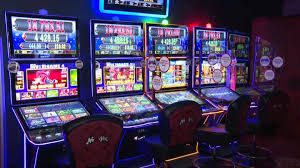
Gambling addiction is a growing issue in many parts of the world, and Pakistan is no exception. While the country has traditionally had strict laws against gambling, the rise of both underground casinos and online gambling platforms has led to an increase in gambling addiction, particularly among younger people. One of the main contributors to this crisis is the growing popularity of slot machines, which have quickly captured the attention of Pakistani gamblers. In this blog, we’ll explore how slot machines are contributing to Pakistan’s gambling addiction crisis and the steps that need to be taken to address the issue.
The Rise of Slot Machines in Pakistan
In Pakistan, gambling has historically been prohibited under Islamic law, but that hasn’t stopped many individuals from engaging in illegal gambling activities. Over the past few years, the emergence of underground gambling establishments and online casinos has made it easier than ever for people to access slot machines. These platforms offer a wide variety of slot games, many of which feature large jackpots and fast-paced gameplay, making them highly attractive to players seeking quick thrills and the hope of striking it rich.
The appeal of slot machines lies in their simplicity. Unlike table games such as poker or blackjack, which require knowledge of strategy and skill, slot machines are entirely based on chance. This makes them accessible to a wider audience, including those who are new to gambling or looking for an easy way to get started. Unfortunately, the allure of slot machines is not just about fun and entertainment—many players get hooked on the excitement, which leads to a growing addiction problem.
How Slot Machines Fuel Gambling Addiction
1. Fast-Paced Gameplay and Instant Gratification
One of the main reasons slot machines contribute to gambling addiction is the nature of the gameplay. Slot machines are designed to be fast-paced, with quick spins and instant rewards. Players don’t have to wait long for the next spin, which creates a sense of continuous excitement. This fast gratification, coupled with the hope of hitting a big jackpot, can lead players to chase losses, spending more time and money on the machines.
In Pakistan, where the gambling culture is still in its infancy, these quick results can create an illusion of control and success, making it harder for players to walk away once they’ve started. The more time spent on these machines, the more entrenched the addiction becomes.
2. The Addictive Nature of Randomness
Slot machines are based entirely on random number generators (RNGs), which means the outcome of every spin is unpredictable. However, the randomness of the results creates an addictive cycle. Players might experience small wins or near-misses, which trigger a dopamine release in the brain. This “near-win effect” encourages players to keep spinning, hoping that the next spin will lead to a big payout.
This type of reinforcement is one of the key factors that makes slot machines so addictive. In Pakistan, where gambling is often seen as a quick escape from financial pressures, many players fall into the trap of believing that a big win is just around the corner. This mindset can lead to compulsive gambling behavior, where individuals keep playing despite mounting losses.
3. The Availability of Online Gambling
The rise of online gambling platforms has made slot machines even more accessible to Pakistani players. With just a smartphone and an internet connection, individuals can play slots from the comfort of their homes. This ease of access makes it harder for individuals to resist the temptation, as they can play any time of the day or night. In many cases, online casinos offer bonus rewards, free spins, and other incentives to keep players engaged, making it even more difficult to stop playing once they’ve started.
Online gambling also removes the social stigma that may be associated with visiting physical casinos or gambling establishments. This anonymity can be particularly harmful, as players are less likely to seek help or admit that they have a problem, which can further fuel addiction.
4. Targeting Vulnerable Players
Many online slot machines are designed to appeal to vulnerable individuals. These games are often flashy, colorful, and filled with themes that attract a wide audience. Moreover, the ease of making deposits and the ability to play for small stakes means that even those with limited funds can continue gambling for extended periods of time.
In Pakistan, where financial stress and unemployment rates are high, slot machines provide a temporary escape from daily struggles. Unfortunately, this form of escapism can quickly spiral into addiction, as players continue to gamble in the hope of winning big, only to face deeper financial difficulties in the process.
The Social and Economic Impact of Gambling Addiction
The consequences of gambling addiction extend far beyond the individual gambler. Families can be torn apart by financial instability, emotional distress, and the strain of living with an addicted loved one. Addiction often leads to poor decision-making, including spending money that should be used for essentials, such as food and rent, on slot machines or other gambling activities.
On a larger scale, the proliferation of slot machines and gambling addiction in Pakistan can have negative effects on society. The increased financial burden on families can contribute to poverty, and addiction-related issues such as mental health problems, domestic violence, and criminal behavior can rise. Moreover, the lack of a proper regulatory framework for gambling leaves individuals vulnerable to exploitation and fraud by illegal gambling operators.
What Can Be Done to Address the Problem?
1. Strict Regulations and Licensing of Online Gambling
One of the most important steps in addressing Pakistan’s gambling addiction crisis is the implementation of strict regulations for both online and offline gambling activities. If gambling were legalized and regulated in Pakistan, there would be more oversight and consumer protection. Operators would be required to follow responsible gambling guidelines, and players would have access to support services and resources to help them manage their gambling habits.
Regulating online gambling platforms would also make it harder for illegal, unlicensed sites to operate, providing a safer environment for players.
2. Public Awareness and Education
Public awareness campaigns are crucial in educating people about the risks of gambling addiction and the impact of slot machines on their lives. By informing the public about the warning signs of gambling addiction and providing resources for those in need of help, Pakistan can take a proactive approach to prevent further harm.
3. Support Services for Gamblers
Pakistan should establish more support services for individuals struggling with gambling addiction. This could include hotlines, counseling, and rehabilitation programs that specifically address gambling-related issues. These services would provide a lifeline to individuals who want to seek help but may not know where to turn.
Conclusion
The growing popularity of slot machines in Pakistan is contributing to a gambling addiction crisis that is impacting individuals, families, and society as a whole. As the availability of both online and underground slot machines increases, it is vital for Pakistan to take steps toward regulating gambling, raising awareness, and providing support for those affected. By addressing the root causes of gambling addiction and offering solutions, Pakistan can work towards a healthier and more responsible approach to gambling.


